 When it comes to your home’s comfort system, you must rely on professionals to handle the installation process. Not only will this ensure the system is hooked up properly, but also that it is the right size for your home.
When it comes to your home’s comfort system, you must rely on professionals to handle the installation process. Not only will this ensure the system is hooked up properly, but also that it is the right size for your home.
In this situation, “size” doesn’t mean the bulk of the unit. The cooling capacity, which is measured in BTU tons, refers to the size of your unit. It’s necessary for your air conditioner to be matched to your home’s cooling requirements. The process of doing this is a complex process called “heat load calculation.”
Just guessing about how powerful a cooling system is, may result in an oversized or undersized unit. This is going to lead to the unit wearing out faster than it should and having to call for heat pump repair in Salt Lake City more often than you should.

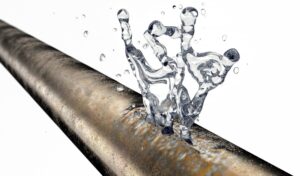 We can tell you all about taking good care of your plumbing system. In fact, if you look back through our previous blog posts, we’ve talked about things like preventing frozen pipes by taking proper precautions, knowing the signs that you might have a leak such as the sound of dripping water when no plumbing fixtures are on, and only putting certain things down your kitchen sink drain to avoid clogs.
We can tell you all about taking good care of your plumbing system. In fact, if you look back through our previous blog posts, we’ve talked about things like preventing frozen pipes by taking proper precautions, knowing the signs that you might have a leak such as the sound of dripping water when no plumbing fixtures are on, and only putting certain things down your kitchen sink drain to avoid clogs.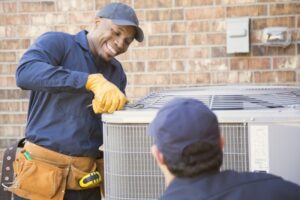 For homeowners looking to install an air conditioner this time of the year, we’re sure that time doesn’t really seem like it’s on your side, right? We get it, but unfortunately rushing into a purchase like this could leave you with a system that operates inefficiently, has frequent repair needs, and might not even last its expected 10-15 year lifespan.
For homeowners looking to install an air conditioner this time of the year, we’re sure that time doesn’t really seem like it’s on your side, right? We get it, but unfortunately rushing into a purchase like this could leave you with a system that operates inefficiently, has frequent repair needs, and might not even last its expected 10-15 year lifespan.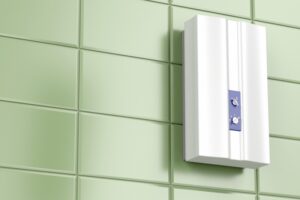 What many homeowners fail to realize about tankless water heaters, is that just like their storage tank counterparts, tankless water heaters need occasional services to stay in good shape. This means keeping on top of repairs as they’re needed but also making sure that you schedule maintenance for these systems on a regular basis. If you have a tankless water heater in your home, you should have professional maintenance done at least every couple of years.
What many homeowners fail to realize about tankless water heaters, is that just like their storage tank counterparts, tankless water heaters need occasional services to stay in good shape. This means keeping on top of repairs as they’re needed but also making sure that you schedule maintenance for these systems on a regular basis. If you have a tankless water heater in your home, you should have professional maintenance done at least every couple of years.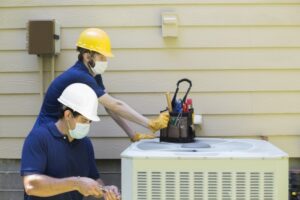 Summer is upon us, and it’s time to put your air conditioner to the test.
Summer is upon us, and it’s time to put your air conditioner to the test. Whether you’ve been in your home for decades and never had your plumbing inspected outside of the initial home inspection (which, by the way, doesn’t involve checking for everything that could impact your plumbing–such as your risk, of experiencing slab leaks or how old your pipes actually are) or you’re having plumbing newly installed, there is one thing we encourage you to keep in mind. This is, how important plumbing maintenance is.
Whether you’ve been in your home for decades and never had your plumbing inspected outside of the initial home inspection (which, by the way, doesn’t involve checking for everything that could impact your plumbing–such as your risk, of experiencing slab leaks or how old your pipes actually are) or you’re having plumbing newly installed, there is one thing we encourage you to keep in mind. This is, how important plumbing maintenance is. If you get water from the city in which you live, versus getting it from a ground well on your property, then you likely know that this water goes through a pretty heavy filtration process at the water treatment plant before it makes its way to you. What you might not know, though, is there could still be impurities with your drinking and potable water, as it has many miles to travel between the water plant and your home. It can pick up some contaminants along the way.
If you get water from the city in which you live, versus getting it from a ground well on your property, then you likely know that this water goes through a pretty heavy filtration process at the water treatment plant before it makes its way to you. What you might not know, though, is there could still be impurities with your drinking and potable water, as it has many miles to travel between the water plant and your home. It can pick up some contaminants along the way. One of the most common repair calls we get for heat pumps is that it’s stuck in one mode or the other. If you’re a heat pump user, then you know these are incredibly efficient, refrigerant-based, and year-round systems that provide you with efficient cooling and heating. But… one problem in particular can cause it to malfunction–its inability to switch from heating mode to cooling mode or vice-versa.
One of the most common repair calls we get for heat pumps is that it’s stuck in one mode or the other. If you’re a heat pump user, then you know these are incredibly efficient, refrigerant-based, and year-round systems that provide you with efficient cooling and heating. But… one problem in particular can cause it to malfunction–its inability to switch from heating mode to cooling mode or vice-versa. Almost any HVAC technician you talk to, including ours, will tell you that scheduling your air conditioner maintenance in the spring is vital to the system’s functionality and efficiency. The reason springtime is the best time is because it’s right before you’ll need your air conditioner the most–waiting until the middle of summer could leave you with an unexpected and disruptive AC breakdown. Scheduling early is also more convenient for you as we’ll have more staff available to serve you as they are less likely to be out on emergency repair calls.
Almost any HVAC technician you talk to, including ours, will tell you that scheduling your air conditioner maintenance in the spring is vital to the system’s functionality and efficiency. The reason springtime is the best time is because it’s right before you’ll need your air conditioner the most–waiting until the middle of summer could leave you with an unexpected and disruptive AC breakdown. Scheduling early is also more convenient for you as we’ll have more staff available to serve you as they are less likely to be out on emergency repair calls.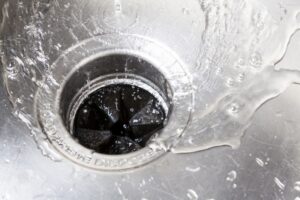 Before you decide to toss those potato skins down the drain, read this blog post. Although it is meant to be very convenient and easy to use, your garbage disposal system wasn’t designed to chew up everything you throw down it. There could be other items, too, that are bad for your kitchen sink in general.
Before you decide to toss those potato skins down the drain, read this blog post. Although it is meant to be very convenient and easy to use, your garbage disposal system wasn’t designed to chew up everything you throw down it. There could be other items, too, that are bad for your kitchen sink in general.
